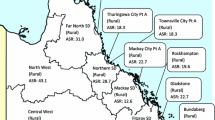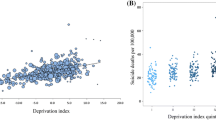Abstract
IntoductionThere are several published studies that have been focused on the ecological association between suicide rates in different areas with indices of deprivation or fragmentation. Most of these studies, however, have used census-based indices of deprivation or fragmentation. In the present study the newly developed Indices of Deprivation have been used, taking into account the results of the spatial autocorrelation tests. MethodsData on all deaths for which suicide or an open verdict was returned during 1996–1998 in England were subjects of this study. These data were provided by the National Confidential Inquiry into Suicide and Homicide by People with Mental Illness. The indices of deprivation and the population counts were provided by the Department of the Environment, Transport and the Region (DETR) and Office for National Statistics (ONS), respectively. ResultsThe results show that, in England as a whole, the rates of suicide in young and middle-aged males were strongly associated with the indices of deprivation. However, the rates of suicide in females and in older age groups were less influenced by the indices of deprivation. In the present study all the indices of deprivation tended to show a similar pattern in which a better socio-economic status of local authorities was associated with a lower rate of suicide.ConclusionThese findings suggest that at the local authority level, the “hot spots” index of deprivation may represent the same level of magnitude in predicting the rates of suicide as the number of unemployed or income-deprived people. However, more studies using multilevel modelling are needed to shed more light on the ecological associations between suicide rates and socio-economic and social cohesion status.
Similar content being viewed by others
References
Ashford JR, Lawrence PA (1976) Aspects of the epidemiology of suicide in England and Wales. Int J Epidemiol 5(2):133–144
Breslow NE (1984) Extra-Poisson variation in log-linear models. Appl Stat 33:38–44
Brown J, Diamond I (1999) Population estimates in small areas: a brief overview. In: Arnold R, Elliott P, Wakefield J, Quinn M (eds) Population counts in small areas: implications for studies of environment and health. ONS, London, pp 5–9
Cantor CH, Slater PJ, Najman JM (1995) Socioeconomic indices and suicide rate in Queensland. Aust J Public Health 19(4):417–420
Carstairs V (2000) Socio-economic factors at areal level and their relationship with health. In: Elliott P, Wakefield JC, Best NG, Briggs DJ (eds) Spatial epidemiology, methods and applications. Oxford University Press Oxford, pp 51–67
Chappell R (1999) ONS procedures for compiling population estimates at sub-national level. In: Arnold R, Elliott P, Wakefield J, Quinn M (eds) Population counts in small areas: implications for studies of environment and health. ONS, London, pp 25–35
Cliff AD (1995) Analysing geographically related disease data. Stat Methods Med Res 4:93–101
Congdon P (1996) Suicide and parasuicide in London: a small-area study. Urban Stud 33:137–158
Congdon P (2004) A multivariate model for spatio-temporal health outcomes with an application to suicide mortality. Geogr Anal 33(3):234–258
Connor MJ, Gillings D (1984) An empiric study of ecological inference. Am J Public Health 74(6):555–559
Crawford MJ, Prince M (1999) Increasing rates of suicide in young men in England during the 1980s: the importance of social context. Soc Sci Med 49(10):1419–1423
Curtis S, Copeland A, Fagg J, Congdon P, Almog M, Fitzpatrick J (2004) The ecological relationship between deprivation, social isolation and rates of hospital admission for acute psychiatric care: a comparison of London and New York City. Health & Place (in press)
Davey Smith G, Whitley E, Dorling D, Gunnell D (2001) Area based measures of social and economic circumstances: cause specific mortality patterns depend on the choice of index. J Epidemiol Community Health 55:149–150
Department of the Environment, Transport and the Regions (2000) Indices of Deprivation 2000. DETR, London
Department of Health (2002) National Suicide Prevention Strategy for England. Stationery Office, London
Diggle PJ (2000) Overview of statistical methods for disease mapping and its relation to cluster detection, and spatial variation in risk. In: Elliott P, Wakefield JC, Best NG, Briggs DJ (eds) Spatial epidemiology, methods and applications. Oxford University Press, Oxford, pp 87–103
Dorlig D (1999) Difficulties and dangers in estimating small area populations for health statistics. In: Arnold R, Elliott P, Wakefield J, Quinn M (eds) Population counts in small areas: implications for studies of environment and health. ONS, London, pp 25–35
Durkheim E (1952) Suicide. A study in sociology, trans. Spalding JA, Simpson G. Routledge, London (original publication 1897)
Elliot P, Best N (1998) Geographical patterns of disease. In: Armitage P, Colton T (eds) International encyclopaedia of biostatistics. Wiley, Chichester, pp 1694–1701
Evans J, Middleton N, Gunnell D (2004) Social fragmentation, severe mental illness and suicide. Soc Psychiatry Psychiatr Epidemiol 39:165–170
Everitt BS (1995) The Cambridge dictionary of statistics in the medical sciences. Cambridge University Press, Cambridge
Gerstman BB (1998) Epidemiology kept simple. An introduction to classic and modern epidemiology. Wiley-Liss, New York, USA
Griffiths C, Fitzpatrick J (2001) Geographical inequalities in life expectancy in the United Kingdom, 1995–97. Health Stat Q 9:16–28
Gunnell DJ, Peters T, Kammerling RM, Brooks J (1995) Relation between parasuicide, suicide, psychiatric admissions, and socio-economic deprivation. BMJ 311:226–230
Gunnell D, Middleton N, Whitley E, Frankel S, Dorling D (2000) An investigation into recent temporal trends and geographical patterns of suicide. University of Bristol, Bristol
Gunnell D (2001) Commentary: suicide and income is the risk greater in rich people who develop serious mental illness? BMJ 322:334–335
Hawton K, Harriss L, Hodder K, Simkin S, Gunnell D (2001) The influence of the economic and social environment on deliberate self-harm and suicide: an ecological and person-based study. Psychol Med 31(5):827–836
Index Team (2000) Response to the formal consultations on the Indices of Deprivation 2000 (ID 2000). Department of Social Policy and Social Work, University of Oxford
Johnson NL, Kotz S, Kemp AW (1992) Univariate discrete distributions. Wiley, New York
Kennedy HG, Iveson RC, Hill O (1999) Violence, homicide and suicide: strong correlation and wide variation across districts. Br J Psychiatry 175:462–466
Krieger N (2001) A glossary for social epidemiology. J Epidemiol Community Health 55(10):693–700
Lawson AB (2001) Tutorial in biostatistics: disease map reconstruction. Stat Med 20:2183–2204
Lorant V, Thomas I, Deliège D, Tonglet R (2001) Deprivation and mortality: the implications of spatial autocorrelation for health resources allocation. Soc Sci Med 53(12):1711–1719
McLoone P (1996) Suicide and deprivation in Scotland. BMJ 312:543–544
Middleton N, Gunnell D, Frankel S, Whitley E, Dorling D (2003) Urban–rural differences in suicide trends in young adults: England and Wales, 1981–1998. Soc Sci Med 57(7):1183–1194
Morgenstern H (1998) Ecological studies. In: Rothman KJ, Greenland S (eds) Modern epidemiology. Lippincott-Raven, Philadelphia, pp 459–480
National Confidential Inquiry into Suicide and Homicide by People with Mental Illness (1999) Safer services. Stationery Office, London
Office for National Statistics (1999) Gazetteer of the old and new geographies of the United Kingdom. Office for National Statistics, London
Rezaeian M, Dunn G, St. Leger S, Appleby L (2004) The production and interpretation of disease maps: a methodological case-study. Soc Psychiatry Psychiatr Epidemiol 39:947–954
Richardson S, Monfort C (2000) Ecological correlation studies. In: Elliott P, Wakefield JC, Best NG, Briggs DJ (eds). Spatial epidemiology, methods and applications. Oxford University Press, Oxford, pp 205–220
Sainsbury P (1955) Suicide in London. Chapman and Hall, London
Saul C, Payne N (1999) How does the prevalence of specific morbidities compare with measures of socio-economic status at small area level? J Public Health Med 21(3):340–347
STATACorp (1999) Stata statistical software: release 6.0. Stata Corporation, College Station, TX
Verheij RA (1996) Explaining urban–rural variations in health: a review of interactions between individual and environment. Soc Sci Med 42(6):923–935
Weyerer S, Brenner MH (1996) Determinants of suicide rates in middle-age in Western Germany between 1955–1989. Eur Psychiatry 111(Suppl 4):359s
Whitley E, Gunnell D, Dorling D, Smith GD (1999) Ecological study of social fragmentation, poverty, and suicide. BMJ 319:1034–1037
Wilkins R, Adams O, Brancker A (1989) Changes in mortality by income in urban Canada from 1971 to 1986. Health Rep 1(2):137–174
World Health Organization (1978) The ninth revision of the international classification of disease and related health problems (ICD-9). WHO, Geneva
Zacharakis C, Madianos M, Stefanis C (1996) Suicide in Greece: regional distribution and relationship to socioeconomic development. Eur Psychiatry 111(Suppl 4):289s
Author information
Authors and Affiliations
Corresponding author
Rights and permissions
About this article
Cite this article
Rezaeian, M., Dunn, G., St Leger, S. et al. The ecological association between suicide rates and indices of deprivation in English local authorities. Soc Psychiat Epidemiol 40, 785–791 (2005). https://doi.org/10.1007/s00127-005-0960-x
Accepted:
Published:
Issue Date:
DOI: https://doi.org/10.1007/s00127-005-0960-x




